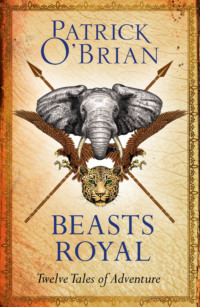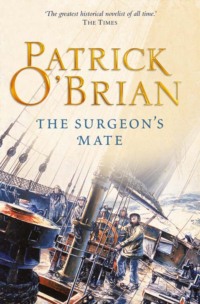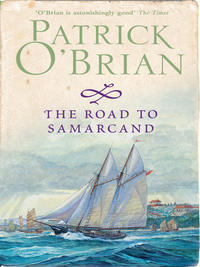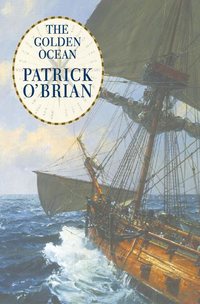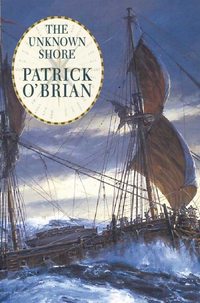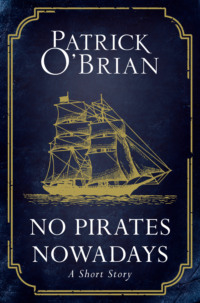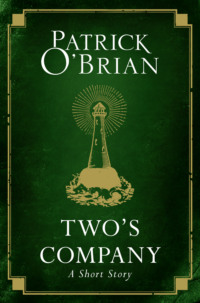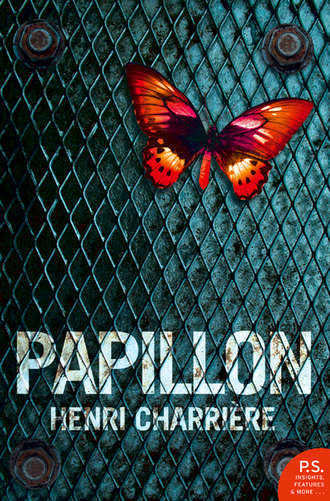
Полная версия
Papillon
This discovery worried us badly. The hedge seemed to be well kept, so it wasn’t old: and we were in danger of being found. We mustn’t light a fire in the daytime: but at night the hunter wouldn’t come. We decided to take it in turns to keep watch in the direction of the traps. We hid the boat under branches and all the stores in the bush.
The next day at ten o’clock I was on guard. For supper we had eaten that pheasant or cock or whatever it was. The soup had done us an enormous amount of good, and although the meat was only boiled it was still delicious. We had each eaten two bowls full. So I was on guard: but I was so taken up with the goings-on of the huge black manioc ants, each carrying a piece of leaf to the enormous ant-hill, that I forgot to keep watch. These ants were close on an inch long and they stood high on their legs. Each one was carrying this enormous piece of leaf. I followed them to the plant they were stripping and I discovered the whole thing was thoroughly organized. First there were the cutters, who did nothing but get the pieces ready: they were working away on a gigantic leaf something like the ones on a banana palm, very skilfully and very quickly cutting off pieces all the same size, which they dropped to the ground. Down below there were ants of the same sort but slightly different. These ones had a grey stripe on the side of their jaws: and they stood in a half circle, supervising the carriers. The carriers came filing in from the right and they went off towards the left in the direction of the ant-hill. They snatched up their loads before getting into line, but sometimes, what with their hurry in trying to load and to get into position, there was a jam. Then the police-ants would step in and shove the workers into their proper places. I couldn’t understand the crime one worker had committed, but she was brought out of the ranks and one police-ant bit off her head while another divided her body in two in the middle. The police-ants stopped two workers; they put down their loads, scratched a hole, buried the three parts of the ant – head, chest, bottom piece-and covered them over with earth.
Pigeon Island
I was so taken up with watching these creatures and following the soldiers to see whether their policing went as far as the entrance to the ant-hill, that I was taken utterly by surprise when a voice said, ‘Don’t move or you’re a dead man. Turn round.’
It was a man bare from the waist up, wearing khaki shorts and long red leather boots. He had a double-barrelled gun in his hands. Medium-sized and thickset: sunburnt. He was bald and his eyes and nose were covered with a bright blue tattooed mask. And in the middle of his forehead there was a tattooed black-beetle.
‘You armed?’
‘No.’
‘Alone?’
‘No.’
‘How many of you are there?’
‘Three.’
‘Take me to your friends.’
‘I wouldn’t like to do that: one has a rifle, and I wouldn’t like to get you killed before I know what you mean to do.’
‘Ah? Don’t you move an inch, then; and just you talk quiet. You’re the three guys that escaped from the hospital?’
‘Yes.’
‘Which is Papillon?’
‘That’s me.’
‘Well then, I can tell you you’ve stirred things up good and proper in the village, with your escape! Half the time-expired men are under arrest at the gendarmerie.’ He came towards me, and lowering his gun he stretched out his hand. ‘I’m the Masked Breton,’ he said. ‘You’ve heard of me?’
‘No, but I can see you’re not a tracker.’
‘You’re right there. I set traps round about here to catch hoccos. A jaguar must have eaten one for me, unless it was you guys.’
‘It was us.’
‘You want some coffee?’ He had a thermos in a knapsack: he gave me a little and drank some himself. I said, ‘Come and see my friends.’ He came and sat down with us. He was amused at my having pulled the rifle trick with him. He said, ‘I fell for it, particularly as everyone knows you left carrying a gun, and there’s no tracker who’ll go after you.’
He told us he had been in Guiana twenty years and that he’d been free these last five. He was forty-five. Because of the silly caper of having had that mask tattooed on his face, life in France didn’t mean anything to him. He worshipped the bush and lived off it entirely – snakes’ and jaguars’ skins, butterfly collections, and above all catching live hoccos, the bird we’d eaten. He could sell them for two hundred or two hundred and fifty francs. I suggested paying for it, but he refused indignantly. This is what he told us: ‘The bird is a sort of wild bush cock. Of course, it’s never so much as seen an ordinary hen or a cock or a human being. Well, I catch one, I take it to the village and I sell it to someone who has a hen-run – they’re always in demand. Right. You don’t have to clip his wings, you don’t have to do anything at all: at nightfall you put him into the henhouse and when you open the door in the morning there he is, standing by, looking like he was counting the cocks and hens as they come out. He comes out after them, and although he eats alongside of them, all the time he’s watching – he looks up, he looks sideways and he looks into the bushes all round. There’s no watchdog to touch him. In the evening he stands there at the door and although no one can tell how, he knows if there’s a hen or two missing, and he goes and finds them. And whether it’s a cock or whether it’s a hen, he drives them in, pecking them like mad to teach them to keep an eye on the clock. He kills rats, snakes, shrews, spiders and centipedes; and a bird of prey has hardly appeared in the sky before he sends everyone off to hide in the grass while he stands there defying it. He never quits the hen-run for a moment.’ And this was the wonderful bird we had eaten like any common barnyard cock.
The Masked Breton told us that Jesus, Fatgut and some thirty other freed men were in prison in the Saint-Laurent gendarmerie, being investigated to see whether any of them could be recognized as having been seen prowling about the building we escaped from. The Arab was in the black-hole of the gendarmerie. He was in solitary, accused of having helped us. The two blows that knocked him out had left no mark, whereas each of the screws had a little lump on the head. ‘For my part, I wasn’t interfered with at all, because everybody knows I never have anything to do with preparing a break.’ He told us Jesus was a sod. When I spoke to him about the boat he asked to see it. He’d scarcely caught sight of it before he cried, ‘But the bastard was sending you to your death! This canoe could never live for an hour in the sea. The first wave of any size, and it’d split in two as it came down. Don’t go off in that thing – it’d be suicide.’
‘What can we do, then?’
‘Got any money?’
‘Yes.’
‘Then I’ll tell you what to do: and what’s more, I’ll help you. You deserve it. You mustn’t go anywhere near the village – not at any price. To get hold of a decent boat you have to go to Pigeon Island. There are about two hundred lepers there. There’s no warder, and no healthy man ever goes, not even the doctor. At eight o’clock every day a boat takes food for twenty-four hours: uncooked food. A hospital orderly hands over a case of medicine to the two attendants, lepers themselves, who look after the patients. No one sets foot on the island, whether he’s warder, tracker or priest. The lepers live in little straw huts they make themselves. They have a central building where they meet. They raise hens and ducks, and that helps them out with their rations. Officially they aren’t allowed to sell anything off the island, so they have an illicit trade with Saint-Laurent, Saint-Jean and the Chinese of Albina in Dutch Guiana. They’re all dangerous murderers. They don’t often kill one another but they do a fair amount of villainy when they get out of the island on the quiet – they go back and hide there when it’s over. They have some boats stolen from the nearby village for these excursions. Possessing a boat is the worst crime they can commit. The warders fire on any canoe that comes or goes from Pigeon Island. So the lepers sink their boats, filling them with stones: when they need one they dive down, take out the stones, and the boat comes up. There are all kinds on the island, every colour and nation and from every part of France. What it comes to is this – your canoe is only any use to you on the Maroni, and without much in it, at that. To get out to sea, you’ve got to find another boat, and the best place for that is Pigeon Island.’
‘How are we to set about it?’
‘This is how. I’ll come with you up the river until we’re in sight of the island. You wouldn’t find it, or at any rate you might go wrong. It’s about a hundred miles from the mouth, so you have to go upstream again. It’s about thirty miles from Saint-Laurent. I’ll guide you in as close as I can and then I’ll get into my canoe – we’ll tow it behind. Then, once on the island, it’s all up to you.’
‘Why won’t you come on to the island with us?’
‘Ma Doué,’ said the Breton, ‘I just set foot on the landing stage one day, the jetty where the official boats come in. Just once. It was in full daylight, but even so, what I saw was quite enough for me. No, Papi: I’ll never set foot on that island again in my life. Anyhow, I’d never be able to hide my disgust at being near them, talking to them, dealing with them. I’d do more harm than good.’
‘When do we go?’
‘At nightfall.’
‘What’s the time now, Breton?’
‘Three o’clock.’
‘OK. I’ll get a little sleep.’
‘No. You’ve got to load everything properly aboard your canoe.’
‘Nothing of the sort. I’ll go with the empty canoe and then come back for Clousiot. He can stay here with the things.’
‘Impossible. You’d never be able to find the place again, even in the middle of the day. And you must never, never be on the river in daylight. The search for you isn’t over, so don’t think that. The river is still very dangerous.’
Evening came. He brought his canoe and we tied it behind ours. Clousiot lay next to the Breton, who took the steering paddle, and then came Maturette, and then me in front. We made our slow way out of the creek and when we came into the river, night was just about to come down. Over towards the sea a huge brownish-red sun lit up the horizon. The countless fireworks of an enormous display fought to be the most brilliant, redder than the red, yellower than the yellow, more fantastically striped where the colours were mixed. Ten miles away, we could distinctly make out the estuary of the splendid river as it ran gleaming pink and silver into the sea.
The Breton said, ‘It’s the last of the ebb. In an hour we should feel the flood-tide: we’ll make use of it to run up the Maroni: the current will take us up without any effort, and we’ll reach the island pretty soon.’ The darkness came down in a single sweep.
‘Give way,’ said the Breton. ‘Paddle hard and get into the middle of the stream. Don’t smoke.’ The paddles dug into the water and we moved quite fast across the current. Shoo, shoo, shoo. The Breton and I kept stroke beautifully; Maturette did his best. The nearer we got to the middle of the river the more we felt the thrust of the tide. We slid on rapidly, and every half hour we felt the difference. The tide grew in strength, pushing us faster and faster. Six hours later we were very close to the island and heading straight for it – a great patch of darkness almost in the middle of the river, slightly to the right. ‘That’s it,’ said the Breton in a low voice. The night was not very dark, but it would have been almost impossible to see us from any distance because of the mist over the face of the water. We came closer. When the outline of the rocks was clearer, the Breton got into his canoe and cast off quickly, just murmuring, ‘Good luck, you guys.’
‘Thanks.’
‘Think nothing of it.’
As the boat no longer had the Breton steering it, we went straight for the island, drifting sideways. I tried to straighten out, turning it right round, but I made a mess of it and the current thrust us deep into the vegetation overhanging the water. We came in with such force, in spite of my braking with my paddle, that if we had hit a rock instead of leaves and branches the canoe would have been smashed and everything lost – stores, food, the lot. Maturette jumped into the water and heaved; we slid under a huge clump of bushes. He pulled and pulled and we tied the boat to a branch. We had a shot of rum and then I climbed the bank alone, leaving my two friends in the boat.
I went along with the compass in my hand, breaking several branches as I went, tying on scraps of flour-sack that I had put aside before we left. I saw a lighter patch in the darkness and then all at once I made out three huts and heard the sound of voices. I went forward, and as I had no idea how to make myself known, I decided to let them find me. I lit a cigarette. The moment the match sparked a little dog rushed out, barking and jumping up to bite my legs. ‘Christ, I hope it’s not a leper,’ I thought. ‘Don’t be a fool: dogs don’t get leprosy.’
‘Who’s there? Who is it? Marcel, is that you?’
‘It’s a guy on the run.’
‘What are you doing here? Trying to knock something off? Do you think we’ve got anything to spare?’
‘No. I want help.’
‘For free or for cash?’
‘You shut your bloody trap, La Chouette.’ Four shadows came out of the hut. ‘Come forward slowly, brother. I’ll bet any money you’re the character with the rifle. If you’ve got it with you, put it down: there’s nothing to be afraid of here.’
‘Yes, that’s me. But the rifle’s not here.’ I walked forward; I was close to them; it was dark and I could not make out their faces. Like a fool I held out my hand: nobody took it. Too late I grasped that this was the wrong move here – they didn’t want to infect me.
‘Let’s go into the hut,’ said La Chouette. It was lit by an oil lamp standing on the table. ‘Sit down.’
I took a straw chair without a back. La Chouette lit three other lamps and set one on the table just in front of me. The wick gave off a sickening reek – the smell of coconut-oil. I sat there: the five others stood. I couldn’t make out their faces. Mine was lit up by the lamp, which was what they had wanted. The voice that had told La Chouette to shut up said, ‘L’Anguille, go to the house and ask if they want us to take him there. Come back with the answer quick, particularly if Toussaint says yes. We can’t give you anything to drink here, mate, unless you’d like a raw egg.’ He pushed a plaited basket full of eggs towards me.
‘No, thanks.’
Very close to me on my right one of them sat down and it was then that I saw my first leper’s face. It was horrible and I made an effort not to turn away or show what I felt. His nose, flesh and bone, was entirely eaten away: a hole right in the middle of his face. I mean a hole, not two. Just one hole, as big as a two-franc piece. On the right-hand side his lower lip was eaten away, and three very long yellow teeth showed in the shrunken gum: you could see them go into the naked bone of the upper jaw. Only one ear. He put his bandaged hand on the table. It was his right hand. In the two fingers that he still had on the other he held a long, fat cigar: he must certainly have rolled it himself from a half-cured leaf, for it was greenish. He had an eyelid only on his left eye: the right had none, and a deep wound ran upwards from the eye into his thick grey hair. In a hoarse voice he said, ‘We’ll help you, mate: you mustn’t stay in Guiana long enough to get the way I am. I don’t want that.’
‘Thanks.’
‘They call me Jean sans Peur: I’m from Paris. I was better looking, healthier and stronger than you when I reached the settlement. Ten years, and now look at me.’
‘Don’t they give you any treatment?’
‘Yes, they do. I’ve been better since I started chaulmoogra oil injections. Look.’ He turned his head and showed me the left side. ‘It’s drying up here.’
I had an overwhelming feeling of pity and to show my friendliness I put my hand up towards his left cheek. He started back and said, ‘Thanks for meaning to touch me. But don’t ever touch a sick man, and don’t eat or drink out of his bowl.’ This was still the only leper’s face I had seen – the only one who had the courage to bear my looking at him.
‘Where’s this character you’re talking about?’ The shadow of a man only just bigger than a dwarf appeared in the doorway. ‘Toussaint and the others want to see him. Bring him over.’
Jean sans Peur stood up and said, ‘Follow me.’ We all went out into the darkness, four or five in front, me next to Jean sans Peur, the rest behind. In three minutes we reached a broad open place, a sort of square, which was lit by a scrap of moon. This was the flat topmost point of the island. A house in the middle. Light coming out of two windows. About twenty men waiting for us in front of the door: we went towards them. As we reached the door they stood aside to let us go through. It was a room some thirty feet long and twelve wide with a log fire burning in a kind of fireplace made of four huge stones all the same height. The place was lit by two big hurricane lamps. An ageless man with a white face sat there on a stool. Five or six others on a bench behind him. He had black eyes and he said to me. ‘I’m Toussaint the Corsican: and you must be Papillon.’
‘Yes.’
‘News travels fast in the settlement; as fast as you move yourself. Where have you put the rifle?’
‘We tossed it into the river.’
‘Where?’
‘Opposite the hospital wall, just where we jumped.’
‘So it could be got at?’
‘I think so; the water’s not deep there.’
‘How do you know?’
‘We had to get in to carry my wounded friend into the boat.’
‘What’s wrong with him?’
‘A broken leg.’
‘What have you done about it?’
‘I’ve split branches down the middle and put a kind of cage round his leg.’
‘Does it hurt?’
‘Yes.’
‘Where is he?’
‘In the canoe.’
‘You said you’d come for help. What sort of help?’
‘A boat.’
‘You want us to let you have a boat?’
‘Yes. I’ve got money to pay for it.’
‘OK. I’ll sell you mine. It’s a splendid boat, quite new – I stole it only last week in Albina. Boat? It’s not a boat: it’s a liner. There’s only one thing it lacks, and that’s a keel. It hasn’t got one: but we’ll put one on for you in a couple of hours. There’s everything there – a rudder and its tiller, a thirteen-foot iron-wood mast and a brand-new canvas sail. What’ll you give me?’
‘You name a price. I don’t know the value of things here.’
‘Three thousand francs, if you can pay it: if not, go and fetch the rifle tomorrow night and we’ll do a swap.’
‘No. I’d rather pay.’
‘OK, it’s a deal. La Puce, let’s have some coffee.’
La Puce, the near-dwarf, who had come for me, went to a plank fixed to the wall over the fire, took down a mess-tin shining with cleanliness and newness, poured coffee into it from a bottle and set it on the fire. After a while he took it off, poured coffee into various mugs standing by the stones for Toussaint to pass to the men behind him, and gave me the mess-tin, saying ‘Don’t be afraid of drinking. This one’s for visitors only. No sick man ever uses it.’
I took the bowl, drank, and then rested it on my knee. As I did so I noticed a finger sticking to its side. I was beginning to grasp the situation when La Puce said, ‘Hell, I’ve lost another finger. Where the devil can it have got to?’
‘Here it is,’ I said, showing him the tin. He picked off the finger, threw it in the fire and gave me back the bowl.
‘It’s all right to drink,’ he said, ‘because I’ve only got dry leprosy. I come to pieces spare part by spare part, but I don’t rot – I’m not catching.’
I smelt burning meat. I thought, ‘That must be the finger.’
Toussaint said, ‘You’ll have to spend the whole day here until the evening ebb. You must go and tell your friends. Carry the one with the broken leg up to a hut, empty the canoe and sink it. There’s no one here can give you a hand – you know why, of course.’
I hurried back to the others. We lifted Clousiot out and then carried him to a hut. An hour later everything was out of the canoe and carefully arranged on the ground. La Puce asked for the canoe and a paddle as a present. I gave it to him and he went off to sink it in a place he knew. The night passed quickly. We were all three of us in the hut, lying on new blankets sent by Toussaint. They reached us still wrapped in their strong backing paper. Stretched out there at my ease. I told Clousiot and Maturette the details of what had happened since I went ashore and about the deal I had made with Toussaint. Then, without thinking, Clousiot said a stupid thing. ‘So the break’s costing six thousand five hundred. I’ll give you half, Papillon – I mean the three thousand francs that I have.’
‘We don’t want to muck about with accounts like a bunch of bank-clerks. So long as I’ve got the cash, I pay. After that – well, we’ll see.’
None of the lepers came into the hut. Day broke, and Toussaint appeared. ‘Good morning. You can go out without worrying. No one can come on you unexpectedly here. Up a coconut-palm on the top of the island there’s a guy watching to see if there are any screws’ boats on the river. There’s none in sight. So long as that bit of white cloth is up there, it means no boats. If he sees anything he’ll come down and say. You can pick papayas yourselves and eat them, if you like.’
I said, ‘Toussaint, what about the keel?’
‘We’ll make it out of a plank from the infirmary door. That’s heavy snake-wood. Two planks will do the job. We took advantage of the night to haul the boat up to the top. Come and have a look.’ We went. It was a splendid sixteen-foot boat, quite new, with two thwarts – one had a hole for the mast. It was so heavy that Maturette and I had a job turning it over. The sail and rigging were brand-new. There were rings in the sides to lash things to, such as the water-barrel. We set to work. By noon a keel, deepening as it ran aft, was firmly fixed with long screws and the four spikes I had with me.
Standing there in a ring, the lepers silently watched us work. Toussaint told us how to set about it and we followed his instructions. Toussaint’s face looked natural enough – no bad places on it. But when he spoke you noticed that only one half of his face moved, the left half. He told me that; and he also told me he had dry leprosy. His chest and his right arm were paralysed too, and he was expecting his right leg to go presently. His right eye was as set as one made of glass: it could see, but not move. I won’t give any of the lepers’ names. Maybe those who knew or loved them were never told the hideous way they rotted alive.
As I worked I talked to Toussaint. No one else said a word. Except once, when I was just going to pick up some hinges they had wrenched off a piece of furniture in the infirmary to strengthen the hold of the keel: one said, ‘Don’t take them yet. Leave them there. I cut myself getting one off, and although I wiped it there’s still a little blood.’ Another leper poured rum over the hinge and lit it twice. ‘Now you can use it,’ he said.
During our work Toussaint said to one of the lepers, ‘You’ve escaped a good many times; tell Papillon just what he ought to do, since none of these three has ever made a break.’
Straight away the leper began, ‘The ebb will start very early this afternoon. The tide’ll change at three. By nightfall, about six o’clock, you’ll have a very strong run that’ll take you to about sixty miles from the mouth of the river in less than three hours. When you have to pull in, it’ll be about nine. You must tie up good and solid to a tree in the bush during the six hours of flood: that brings you to three in the morning. Don’t set off then, though, because the ebb doesn’t run fast enough. Get out into the middle at say half past four. You’ll have an hour and a half to cover the thirty odd miles before sunrise. Everything depends on that hour and a half. At six o’clock, when the sun comes up, you have to be out at sea. Even if the screws do see you, they can’t follow, because they’d reach the bar at the mouth of the river just as the flood begins. They can’t get over it, and you’ll already be across. You’ve got to have that lead of half a mile when they see you – it’s life or death. There’s only one sail here. What did you have on the canoe?’


